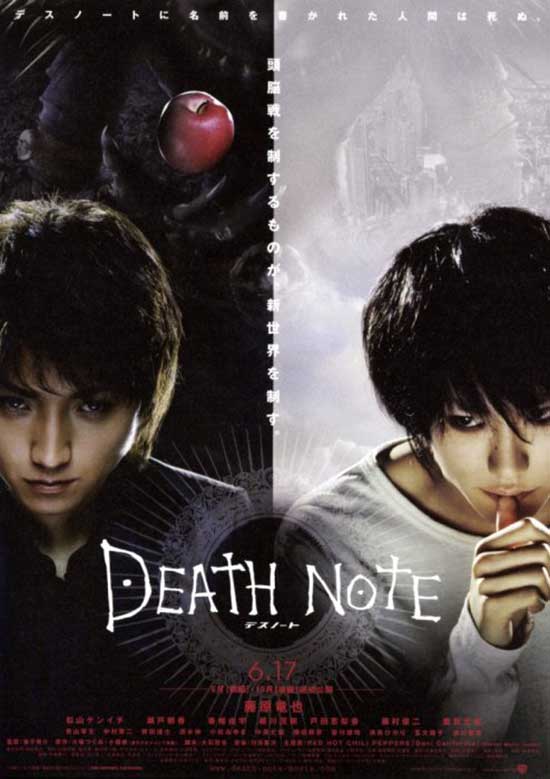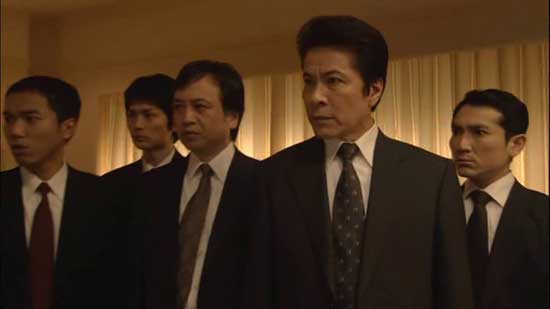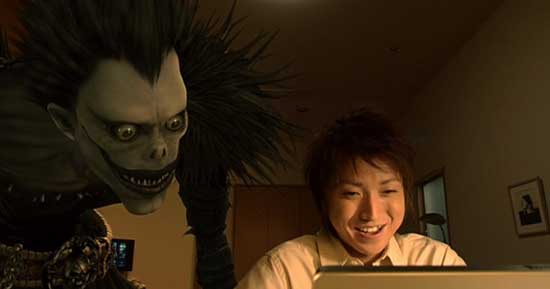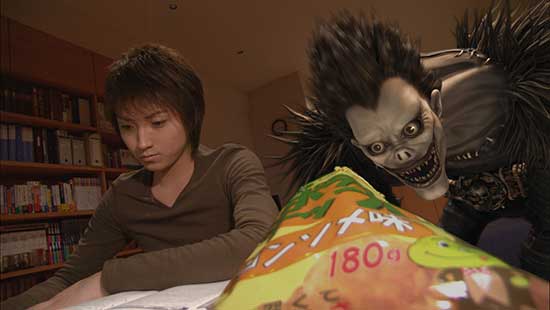SYNOPSIS
A battle between the world’s two greatest minds begins when Light Yagami finds the Death Note, a notebook with the power to kill, and decides to rid the world of criminals.
REVIEW:
Death Note 1 is supernatural action thriller based on a best-selling manga by the same name. Written by Tsugumi Ohba and illustrated by Takeshi Obata it was originally published as series in Weekly Shonen Jump manga magazine from 2003 to 2006 and later on collected into 12 individual volumes. Following the popularity of the comics, Madhouse animation studio developed the series into a 37-episode anime in 2006-2007. Furthermore, Konami developed the series into assorted video games for Nintendo DS and finally, with the help of both Ohba and Obata and the director Shusuke Kaneko, Death Note was turned into a series of three live action films, Death Note 1 naturally being the first one.
Not having read any of the 108 chapters of the Death Note manga, I felt like I came into this cinematic experience slightly blind. It didn’t hurt my understanding of the story as Death Note works perfectly well as a stand-alone film, but for the purpose of reviewing it, reading the mangas would have obviously helped me to know how the film compares to its source material. Reading around the subject I’m given to understand that the live action version is fairly loyal to the original storyline and looking at the artwork of Obata, the actors certainly have been styled in keen likeness of their comic book counterparts. This seems to also be true about some of the mannerisms of the main characters. Especially Ken’ichi Matsuyama as L has certainly taken notes from the comics pages. However, as said above, not knowing too much about the original comics, I can only review Death Note as it is, rather than an extension of the comics and animation series.
The basic premise of Death Note is very simple; an intelligent but somewhat bored law student Light Yagami (the seemingly ageless Tatsuya Fujiwara) finds a supernatural notebook dropped to the human world by a shinigami (a Japanese “death spirit” or “god of death”) named Ryuk (voiced by Shido Nakamura). The book has the power to kill anyone whose name gets written in its pages, turning its owner into a god like puppet master. Disillusioned with the modern justice system, it does not take Light long to take the law in his own hands and start killing criminals in attempt to create a crime free utopia.
While Death Note seemingly has some deeper themes behind it, the main focus of the story is in the cat and mouse game between Light and “the world’s best detective” L. While Light’s powers for manipulating people are nearly boundless, L’s investigatory skills certainly match that power almost annoyingly well. I’m not exaggerating if I say that even Sherlock Holmes and Hercule Poirot combined would have nothing on the essentially supernatural detective capabilities of the mighty L. I have to admit that as a lover of a good detective drama this was a minor niggle for me, but a superhuman villain needs an equal adversary, so I did my best to not let it bother me. Also, how quickly the so far law abiding Light turns into a serial killer seemed a bit fast paced to me, but I tried my hardest to put this fact to one side and enjoy the story for what it is: light entertainment. As such Death Note succeeds very well. While some parts may have dragged on a little bit too long and part of the storyline got slightly repetitive, for the most part I found Death Note fairly entertaining experience.
Now as an adult viewer, I have to admit that I was sorely missing something a little bit deeper behind the action filled story. The reason I make a point about being an adult is that Death Note is obviously aimed at slightly younger audiences. This makes sense of course as the mangas were also written for the teen market and both the comics and the film did very well indeed among their target audiences, the film topping the Japanese box office for two weeks and pushing Da Vinci Code into second place. As I have personally have not been part of that particular consumer group for over a decade now, I found myself trying to find more profound themes within the story. All the elements are there: a disillusioned protagonist on a vigilante killing spree is certainly a theme that offers many interesting questions about ethics, moral and the general state of modern legal system. After all it is a theme that has been explored many times over the years, my personal favourites being such 1980’s classics as Vigilante (1982) and Exterminator (1980) and on that basis, I was hoping to see a glimpse of a similar study of the same subject matter. Unfortunately, I was left hoping, being that besides for a few fleeting conversations about the nature of good and evil, Death Note barely touches upon these subjects. The focus of the film stays firmly on the cat and mouse chase between Light and the various law enforcement agencies trying to catch him. Even in the very end, where Light’s ambition to create his paradise without crime takes a surprisingly dark turn, these themes are not grasped upon, and that more than anything really got under my skin.
All that being said, Ohba himself has states in an interview that when he wrote Death Note he did not have a specific theme in mind and rather than focusing on heavier topics, he wanted the story to be “pure entertainment”, leaving my ramblings about deeper meaning, well, meaningless.
As I said above, I was not quite the target market for this film, but it did not stop me from enjoying it. The sixteen-year-old me would have probably enjoyed it a whole lot more and would not have gotten quite as annoyed by the patent superficiality of the plot and the characters, but as a whole I still enjoy it. As long as you do not take it too seriously or expect a profound study of the human condition, Death Note is a solid piece of entertainment.
 Horror News | HNN Official Site | Horror Movies,Trailers, Reviews
Horror News | HNN Official Site | Horror Movies,Trailers, Reviews















